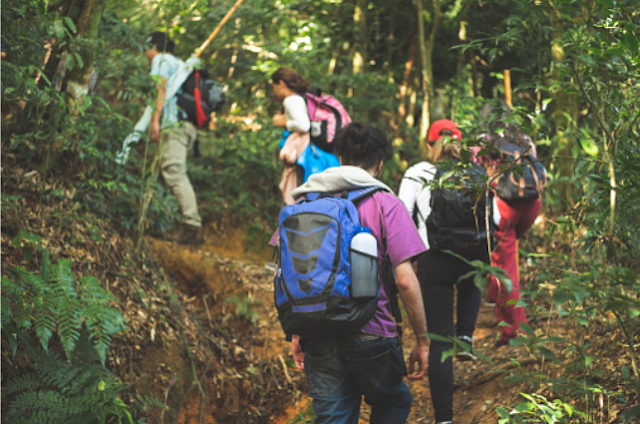- Interest: Political, commercial, resources, etc. Most of the travelers were guided by the motive for power expansion, resources captured, and commercial purposes.
- Curiosity: Travelers like to visit new places, interact with new people. Travelers used to be more curious about new Places & people. This results in the discovery of India, the USA, China, Australia, etc.
- Religious Sentiments: People during the past used to visit especially due to religious motives. Lumbini & KTM Valley, Jerusalem, Mecca Madina are some examples of religious sites.
These visits made due to the above motive give some sort of Ecotourism flavors as well due to its long route in high altitude, high land, adventure, culture, lifestyle, no named ecotourism but still at that time ecotourism carried on.
Evolution of Tourism Activities
Thomas Cook is a first-person who organized a packaged tour from Europe since 1841. The tour operator of the USA begins tourism activities since 1866. In India organized tour was organized since 1938. In the case of Nepal, commercial tourism started in 1957 but geared up since 1970.
The invention of photography, bicycle, traveler cheque, technology, the motor car, the steam engine, etc. makes people easy to travel long distances in a short time interval. The advancement of technology makes travel more fun, easy, quick, and luxurious. During the 19th and 20th century increase in disposable income and leisure holiday, and increase commercial jet plan flights make travel even easier.
The development process of Ecotourism
The ‘Brundtland Report’ in 1987 by the World Commission on Environment and Development, has suggested changes in the way people live & do business. Otherwise, we face unacceptable levels of human suffering and environmental damage. Before that in 1982 Sustainable development approach appears, which motives are included in the Brundtland Report as well. In 1992 during the Earth summit, the issues rose even higher discussing how to save this world. Which brings environment movement, along with that ecotourism born with the motive of balancing development activities and ecosystem.
Environmentally sound and culturally sensitive tourism programs are formulated as a strategy for sustainable development (From the Rio Earth Summit Agenda 21, United Nations, 2002). Tourism should be carried on sustainably or should give a flavor to sustainability. The major steps are taken that proofs tourism in the track of sustainable tourism can be shown in the following statements.
- The United Nations Commission for Sustainable Development endorsed the Global Code of Ethics for Tourism (GCET) in April 1999, Stepping on Agenda 21 of Earth Summit. If not followed damaged causes reduced profits in tourism/ no longer sustain tourism in the long run. The Code of Conduct of tourism is a list of what should do and don’t to save tourism.
- The International Ecotourism Society (TIES) presented the Oslo Statement on Ecotourism in 2007. These instruments all deal more or less with the environmental face of tourism.
- There are many different forms of tourism that can be distinguished from one another by their contrasting components. They include mass; small scale; green; alternative; appropriate; nature; responsible; eco-; (Gilbert et al., 1994); academic; adventure; agro-; anthro-; archaeo-; cottage; culture; ecological; environmentally friendly;
 |
| Trekking trail with Mountain Scenic Beauty |
Mass tourism is a traditional form of tourism development, short term free-market principles dominate to maximize income. Alternative tourism is a whole range of tourism strategies e.g. appropriate, eco, soft, responsible, people to people, controlled, small scale, cottage & green tourism.
Mass tourism can’t totally neglect as it provides a significant amount of tax and income to the government. Also, 30% or less occupancy of hotels in touristic destinations had faced hard to run in the proper standards. Hotels with 20-25% occupancy can run with the hope they would recover later while hotels with even less than that occupancy have no other choice than to shut down. Resources of nature can’t be kept unused during tourism activities but can be made more responsible, develop tourism as sustainable and appropriate tourism as fundamental.
Beginning of Mass Tourism
In the late 1800s, mass tourism was originally developed in the UK by Thomas Cook, who pioneered the concept of affordable group travel tours. He made it possible by establishing relationships between tour operators, transportation companies, and hotels. Cook was able to get deep volume discounts on travel services and pass those savings along to its customers.
Mass tourism to Alternative Tourism
In modern times, the phrase often refers to budget-friendly package tours, cheap flights, all-inclusive resorts, and cruises. In general, it allows vast numbers of travelers to descend on a given destination in a relatively short time, usually during peak season. You can minus the mass tourism but get together with ecotourism.
It is inarguably the most popular form of tourism. But most responsible travel experts consider it a shallow, exploitative and unsustainable form of travel. Income also harms when mass tourism operated for longer intervals, it’s not responsive tourism, no local benefits, unnecessary exploitation of resources, benefit by few corporate. However, it can be improved by environment-friendly alternative approaches like making tourism activities more destination friendly, local community benefiting, awareness creating. Alternative approach arrived first which later developed as Sustainable tourism i.e. ‘Ecotourism’. It is felt that mass tourism can’t do better for the local community and environment.
Alternative and Sustainable Tourism
- The concept started in 1980 with new activities
- New tourism instead of the traditional one
- Tourism with reform for balancing
- Less & Less negative impact on economic, socio-cultural & Environment aspects.
- Respect the local culture, values & traditions
- Transparent in tourists’ activities: Controlled illegal activities, check irresponsible activities
- People participation for preservation: Self acknowledge required
- Known as Sustainable & Responsible Tourism
- “Thus, alternative tourism can be viewed as being synonymous with the concept of sustainable tourism development” (Holden, 2000).
Alternative Tourism: Sustainable & Responsible Tourism
Alternative tourism can be defined “as forms of tourism that made to be friendly to the environment and to respect social and cultural values of the communities, and which allow both hosts and guests to enjoy positive and worthwhile interaction and shared experience” – (Wearing & Neil, 2000).
If enterprises monitor and report on responsible activities (E.g. reducing waste and purchasing local produce) over time, they can cumulatively contribute to a more sustainable tourism industry. Therefore practicing ‘responsible” tourism on an operational basis becomes the mechanism by which “sustainable” tourism.
Principle of Responsible Tourism
The cape town declaration (2002) adopted after the conference on responsible Tourism in the destination by 280 delegates from 20 countries.
Tourism/Ecotourism Products
A tourism product is composite in nature and includes everything the tourist purchases, sees, experiences, and feels from the start of the tour until return to home.
- Site attractions: Niagara Falls, the Swiss Alps, and the Himalayas, etc.
- Built attraction: Made by the effort of man such as Disney Land of USA, {yramids of Egypt, Taj Mahal of India, the Great Wall of China, the Eiffel Tower of Trance, and so on.
- Event attractions: are those where the event staged is a larger factor of the tourist’ choice that the site e.g. the Olympic games, and Fashion shows or exhibitions
Ecotourism flavors on these on Built attraction, less in event attractions, but can be more responsible on but not complete ecotourism product.
 |
| Jungle walk with a backpack |
Components of Ecotourism
- Contributes to the conservation of biodiversity
- Sustain the wellbeing of local people
- Includes an interpretation/learning experience
- Involves responsible actions on the part of visitors & the tourism industry
- It delivered primarily to small groups by small scale
- Local people participation should encourage
General requirements for Eco-tourism
- Provide the first-hand encounter with the natural environment
- Actively involve local communities in the tourism process
- Its travel of gratification is measured in terms of education or appreciation
- It involves considerable preparation & in-depth knowledge among the leaders & participants
- It does not degrade the natural and cultural resources
- Promotes positive environmental ethics & fosters preferred behaviors
- Concentrates on intrinsic rather than extrinsic values.
- Oriented around the environment in question & not around a man.
- It must support to preserve the wildlife and environment.
- An essential feature of ecotourism is sustainability
Principles of Sustainable Tourism for Quality Tourism (Tourism Concern 1991)
- Using resources sustainably
- Maintaining biodiversity
- Integrating tourism into planning: Infrastructure-tourism friendly, eco-friendly
- Supporting local economics
- Involving local communities: Whether local people really benefited because they are the main stakeholders. Larger organizers benefited the control business point. Local taken as zoo people, tourists come and visit leave nothing to local people. Surubari – no concern with nearby community, other stakeholders, the cultural program performing community, local stakeholders should concern,
- Consulting stakeholders and the public
- Training Staff
- Marketing tourism responsibly: What possible only that marketing, may cause negative if not controlled,
- Undertaking research: Every three-year research, review, not done, evaluation, not practical, each five-year research required, 2.5/3 yrs mid-term evaluation about details changes, requirement, etc.
Rules for the promotion of ecotourism
- Be friendly with the visitors and help them to practice the ecotourism code of conduct.
- Make no open fires and discourage others from doing so.
- Give information to the guest about attractions, facilities, local customs & traditions, prohibitions & regulations.
- Ensure adequate opportunities to visitors for communication with nature and native culture etc.



0 Comments